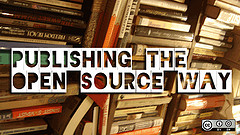Publishing the open source social media way

Do professional researchers truly want social media integrated into their research experience? There certainly is the issue of presenting too many documents to the professional trying to resolve a client’s question. Social media could be simply “too noisy.” Another issue is that of authority. Professional human editors author explanations that presuppose the complex relative authority of different sources of law. Social media is not a source of law. Anyone who retrieves search results from social media alongside human editorially reviewed content must filter out irrelevant content and be knowledgeable about the relative authority of all content types retrieved by the search. For example, if you run a search in a public search engine, you might retrieve links to official government sources of law alongside Twitter feeds and videos on YouTube. Professional customers value the extensive post-search filters that professional research services apply to human editorially reviewed content.
Barker comes from a background in professional publishing, including serving as a Product Manager and Executive Legal Consultant at LexisNexis and an Account Manager for Thomson Reuters. That’s a publishing background that guys like me are not equipped with, but it’s a background where companies sell books and, and now, online research with the value adds being 1) production of the content with strong editorial oversight (authority), 2) distribution of the content, and 3) vehicles to consume the content (books, online environments, and apps). With the advent of blogs and other social media, do traditional publishers play as important a role? Academics, government authorities, and practicing professionals (lawyers, scientists, doctors) all can publish via blogs (production). Distribution of content comes from RSS to readers and social media, whether it be Facebook, Twitter, or LinkedIn. Consumption comes from apps produced by companies who specialize in apps for the consumption of content (think iPad, Kindle, Flipboard). Authority? Traditional publishers have a small pool editors of their choosing who bring their biases to the table, whether biased by strong beliefs or bias fueled by the companies underwriting the editors research. Social media, with information moving at lightening speed, brings collaboration, learning, vetting, and peer review like we have never had before. Arguably far stronger than the authority traditional publishers can bring. Barker acknowledges there is an opportunity for traditional publishers to harness social media and “…[T]o determine the best way to integrate social media into human editorially reviewed search results.” He continues that “Prototypes that experiment with different models of integrating social media into search results would be helpful.” The fact is professionals and companies are already integrating social media into their research. Prototypes integrating social media into search results is already happening. Google alone, has 100 times the engineers as traditional publishers will ever have already working on this and giving us live prototypes ala ‘Search Plus the World.’ What’s missing is traditional publishers not freeing up their content , writers, and publishers to have their research, insight, and commentary so that it can be integrated into social search and social discovery. The genie is not going back in the bottle. Information is best open and free flowing. More and more professionals are realizing that each day. We’re not going back to the day where traditional publishers can demand that social media be integrated into their research. We’re moving forward to the day where content from traditional publishers will be integrated into social media, or in other words, open source publishing.
